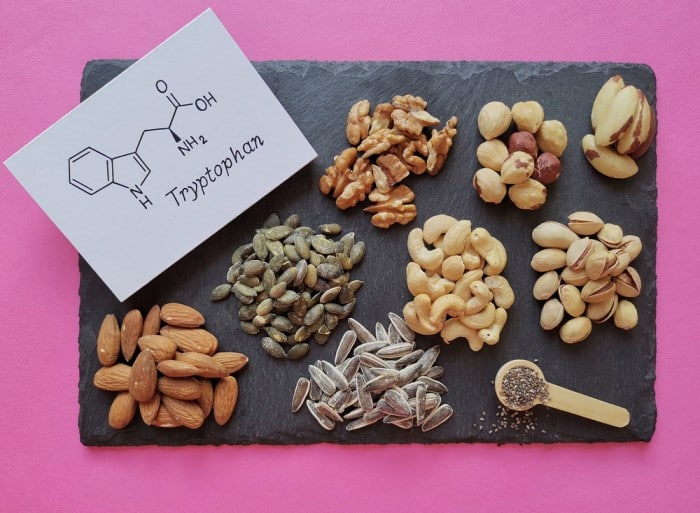Sleep is essential to our physical, emotional, and mental health. No wonder we spend 1/3 of our lives doing it. Our body is recharged with a good night’s sleep, leaving you feeling refreshed and energized upon waking up. The average adult needs between 7-9 hours of sleep per day. Any less can cause an increased risk of developing chronic conditions such as obesity, diabetes, heart disease, stroke, and poor mental health. Did you know there are various foods that help you sleep better?
The Science Behind Sleep Inducing Foods
Your hormones are responsible for so many processes within your body. They help you grow&reproduce, regulate your appetite, and manage your sleep. It’s hardly surprising then that different hormones can affect your sleep patterns in different ways. There are many chemicals, amino acids, enzymes, nutrients, and hormones that work together to promote good sleep and regulate the sleep cycle, including:
- Tryptophan
- Melatonin
- Calcium
- Potassium
- Magnesium
- Vitamin D
- Antioxidants
- Serotonin
Although many foods contain low levels of these sleep-promoting compounds, some have high concentrations that could potentially affect your sleep cycle. Now, this does not mean that consuming foods with these components will guarantee you sleep more.Overeating anything will cause worse sleep quality. However, eating certain foods in moderation later in the day could lead to better sleep quality. So, what are some sleep-friendly foods? Let’s have a look at foods that help you sleep better!
Top 10 Foods That Help You Sleep Better
Almond
It has been claimed that almonds can help improve sleep quality. This is because almonds, along with some other nuts, are a source of melatonin, which regulates your internal clock and helps the body prepare for sleep. One serving of almonds contains 77 mg of magnesium and 76 mg of calcium. These two minerals can help promote muscle relaxation and sleep. If you want to eat almonds to determine if they affect your sleep quality at bedtime, about a handful will do.
Kiwi
Kiwi is a low-calorie and very nutritious fruit. It contains adequate amounts of folate and potassium as well as high amounts of fiber and antioxidants. According to research on their potential to improve sleep quality, kiwi can also be one of the best foods to eat before bed. Eating 1-2 medium kiwis close to bedtime should do the trick.
Chamomile Tea
If you replace your regular cup of tea with chamomile tea, the benefits are immense. Drinking chamomile tea can strengthen your immune system, reduce anxiety and depression and improve skin health. Additionally, chamomile tea has some unique properties that can enhance the quality of sleep. Chamomile is rich in apigenin, an antioxidant that binds to specific receptors in your brain that can increase sleepiness and reduce insomnia.
Tart Cherries and Tart Cherry Juice
Cherries are rich in four different sleep-regulating compounds: melatonin, tryptophan, potassium, and serotonin. Research suggests that antioxidants called polyphenols in sour cherries may also affect sleep patterns. In a study, tart cherry juice is linked to more prolonged and higher quality sleep. Cherry juice might be an excellent ending to your dinners!
Tofu
Tofu and other soy-based foods are known to support sleep quality. Incorporating tofu to your dinner plate or snacking on edamame might help you get a head start on a good night’s sleep.
Fatty Fish
Fatty fish, such as salmon, tuna, trout, and mackerel, contain plenty of Vitamin D and Omega-3 fatty acids essential to serotonin production. Serotonin is mainly responsible for establishing a fixed sleeping and waking cycle. You can give your melatonin levels a head start by eating fish for dinner before turning out the lights.
Watermelon
A cup of watermelon later in the day helps you stay hydrated and is also a good source of fiber. Since you are well hydrated before sleeping, your body doesn’t wake you in the middle of the night to fulfill its thirst requirements. However, make sure you consume these melons in moderation as your bladder might wake you up at night, thanks to watermelons’ high water content.
Walnuts
Walnuts are a great nighttime snack generally considered one of the essential foods that help you sleep. Walnuts also support melatonin regulation and help improve sleep quality. They provide Alpha-Linolenic Acid (ALA), an Omega-3 fatty acid that is converted into DHA in the body, increasing serotonin production.
Green Leafy Veggies
How do green leafy vegetables, an indispensable part of our salads, contribute to good sleep? Lettuce and lettuce seed oil may help promote sleep quality; some even claim that lettuce has mild sedative effects! Researchers believe that most of the sedative effects are due to the plant’s fraction, specifically the lactucin compound.
Oatmeal
Oats contain tryptophan, an amino acid that the brain converts to serotonin and helps relax the body. The brain needs tryptophan to produce serotonin, so getting enough of it is essential for sleep quality. A recent study notes that oats are high in melatonin, which can help you fall asleep, so maybe think of more ways to eat oats later in the day.
If you’re looking to build new habits and enhance your health, then it’s time to start thinking about what you should be doing differently in your life. The good news is that there are many ways to make changes to your lifestyle that can improve your health and lead to better overall wellness. If you want to learn how to live a healthier lifestyle, download wannawell app for free.




Recent Comments